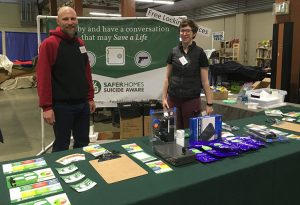
The Safer Homes, Suicide Aware public education campaign reached more than 250 firearms owners at the Spokane Gun Show & Flea Market, held at the Spokane County Fairgrounds and Expo on April 7-8. With few exceptions, these attendees walked away with free locking equipment for firearms and medications.
Safer Homes staff and volunteers talked with attendees about their current storage practices for firearms and medications and about suicide loss. The conversations are intended to raise awareness of suicide in Washington’s communities and to help change practices around safely storing firearms and medications.
The initiative is the result of collaborative work by the Safer Homes Coalition, a group of firearms retailers, Second Amendment rights groups, health care providers, and suicide prevention experts. The coalition’s single goal is to save lives. Coalition co-chairs are Jennifer Stuber, cofounder of Forefront Suicide Prevention, and Alan Gottlieb, founder of the Second Amendment Foundation.
Each attendee chose a firearm locking device (a lock box or Life Jacket Firearm Locking Safety Case) and a medication device (a drug deactivation pouch or medications lock).
“I would talk to people and show them the devices,” said Forefront MSW Practicum student Delaney Knottnerus. “I would explain how we are a suicide prevention coalition, made up of 43 partners across Washington state, whose goal is to limit unauthorized access to firearms and medication in homes.
“When you’re at an event like this, you meet and get to know the vendors around you,” Knottnerus said. “People will ask about my own personal beliefs, and I work to keep my responses focused around the issue, which is trying to save lives and lower rates of suicide.”
The task force began in 2016, after the Washington legislature passed House Bill 2793. Forefront and the firearms community found common ground around the issue of suicide prevention. “You never know when you begin a conversation how it will go. Is this person still grieving a suicide loss? Or is he intently focused on Second Amendment issues and more interested in who we represent?” said program manager Marny Lombard. “We do a fair amount of meeting people where they are.”
Locked storage of firearms and medications can put a barrier between someone in a mental health crisis and who may move toward an impulsive suicide. With that extra passage of time, the sense of crisis can ease and the person may decide to seek help. The initiative’s emphasis on locking up medications and disposing of expired or unused medications also will help to prevent overdoses and addiction.
This was Safer Homes third gun show in Washington. Spokane Gun Show promoter Wes Knodel hosted Safer Homes at no cost. Knodel spoke of a suicide loss in his own life.
Knottnerus told of one man who returned to the Safer Homes booth to thank her and tell her that getting the locking device was the best part of the gun show.
Suicide impacts many people, some with close losses and others who know a friend with a suicide loss.
“There was a grandfather who was still grieving for his grandson who had died many years before,” Lombard said. “When I told him that I lost my son five years ago, he reached out and hugged me across the table – and we both had tears in our eyes.”
Safer Homes, Suicide Aware exceeded its goal of distributing over 250 free firearm and medication locking devices.
Knottnerus said. “People love their guns and want to have them for recreation and self-defense. Our goal is to make sure we help them limit unauthorized access. Putting a practical barrier between a suicidal person and the means they plan to use to end their life can interrupt their path to suicide.”
